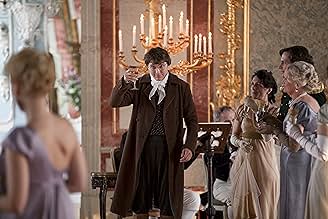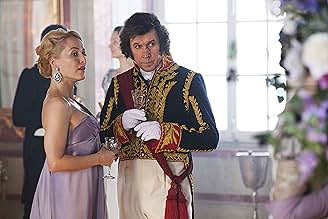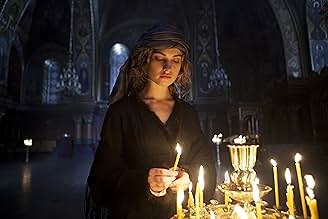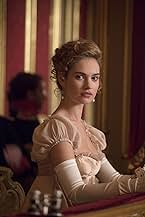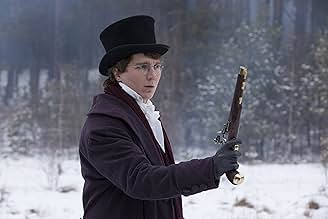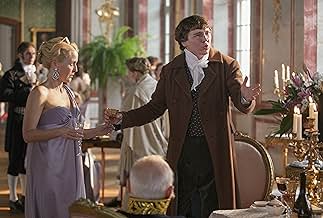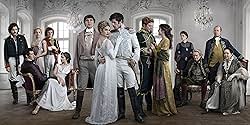Mentre il conflitto russo con Napoleone raggiunge il culmine, cinque famiglie aristocratiche affrontano la possibilità che le loro vite cambino per sempre.Mentre il conflitto russo con Napoleone raggiunge il culmine, cinque famiglie aristocratiche affrontano la possibilità che le loro vite cambino per sempre.Mentre il conflitto russo con Napoleone raggiunge il culmine, cinque famiglie aristocratiche affrontano la possibilità che le loro vite cambino per sempre.
- Candidato a 1 Primetime Emmy
- 3 vittorie e 19 candidature totali
Trama
Lo sapevi?
- QuizThe soundtrack is recorded in a collaboration with choir "Latvia" and Latvian Radio.
- BlooperUniforms in the Russian army changed three times during the period covered in the movie, but there is only one shown in the series.
- Citazioni
[last lines]
Pierre Bezukhov: [voice-over] They say sufferings are misfortunes. But if I was asked, would I stay as I was before I was taken prisoner, or go through it all again? I would say for God's sake, let me be a prisoner again.
Pierre Bezukhov: Come, let's sit and eat and give thanks for our good fortune.
Pierre Bezukhov: [voice-over continued] When our lives are knocked off course, we imagine everything in them is lost. But it is only the start of something new and good. As long as there is life, there is happiness. There is a great deal... a great deal still to come.
- ConnessioniFeatured in The Wright Stuff: Episodio #21.5 (2016)
Of the major versions, the best version is the 1972 mini-series with Anthony Hopkins, not only an ideal adaptation of the book and as faithful as one could get but also brilliant in its own right, one of the best the BBC ever produced. The 1966 Russian one directed by Sergei Bondarchuk, while not as accessible, is a close second, a towering achievement and contains the best battle and ballroom scenes of all the War and Peace adaptations. The 1956 King Vidor film has a number of good things, like the production values, the music score, Audrey Hepburn and some of the supporting cast but the sound quality and two male leads are very problematic and the story is not as riveting as it could have been. Faring least is the 2007 adaptation with Clemence Posey as Natasha, beautiful production values and some impressive supporting performances but sunk by the problematic performances of the three leading characters, awkward and underwritten script-writing and bland storytelling.
This latest offering from 2016 courtesy of BBC is not as good as the 1972 mini-series or the Sergei Bondarchuk, but is far more successful than the 1956 film and 2007 adaptation. It isn't one hundred percent flawless, agree with Andrew Davies himself that the mini-series could have been two episodes longer as the final episode did feel a little rushed and Helene's story too hastily and conveniently wrapped up. Although the production values are wonderful on the whole, some of the costumes don't fit as well with the period and are not as lavish as the rest and some of the make-up is 21st century-ish.
However, considering that adapting 'War and Peace' is a mammoth task and virtually impossible to be word for word, detail for detail this does very well as an adaptation. It is condensed and not one hundred percent faithful, but the heart and soul of the book is there and while focusing predominantly on the relationships between the characters and the characterisations it is very intelligently written and everything feels coherent and emotionally investible. Even if the Sergei Bondarchuk film has more beautiful ballroom scenes and more powerful war scenes, this adaptation hardly underwhelms in either.
'War and Peace' (2016) stands brilliantly on its own, and shouldn't be marked down solely for it not being a completely faithful adaptation, that is not fair on the adaptation as they are two different mediums and deserve to be treated as such. It is wonderfully made for starters. The photography is some of the most beautiful personally seen all year on television, almost poetic and heart-breaking in its beauty (episode 3 is particularly striking), the settings, interiors and period detail is sumptuous in every sense and it's always special when scenery is like a character all of its own and the Russian landscapes is one of the greatest examples of that, as well as looking exquisite, seen anywhere on film or television not just this year but possibly ever.
Another standout is the music score, words cannot describe how amazing it is. Not only is it so dynamic with every scene, with the haunting choirs, chilling ambiance, poetic nuance and rousing bombast even enhancing the impact, but it serves as an amazing score on its own and one of the best music scores for television this year as well as worthy of its very own soundtrack album. The script is very literate and intelligent, the characterisation meaty and the dialogue always flowing beautifully. The storytelling throughout is engrossing with a lot packed in but elaborated upon enough to make it fascinating and easy to follow.
Performances are top-notch, regardless of any reservations as to whether certain actors are right physically. Paul Dano's sensitive and multi-faceted portrayal Pierre is one of the most successful ones of all 'War and Peace' adaptations, and is one of his best overall performances. Wasn't sure about Lily James at first, but as the character grows James grows too and becomes enchanting. James Norton is a handsome, commanding and tragic Andrei. In support, standouts are an outstanding Jessie Buckley, Tuppence Middleton as a Helene that's somewhat both a villain and a victim and Jim Broadbent's incredibly powerful and affecting Bollonsky (especially his breakdown).
Overall, a very successful adaptation of 'War and Peace'. 9/10 Bethany Cox
- TheLittleSongbird
- 23 ott 2016
- Permalink
I più visti
Dettagli
- Data di uscita
- Paese di origine
- Siti ufficiali
- Lingue
- Celebre anche come
- War and Peace
- Luoghi delle riprese
- Lituania(Vilnius)
- Aziende produttrici
- Vedi altri crediti dell’azienda su IMDbPro
Contribuisci a questa pagina




